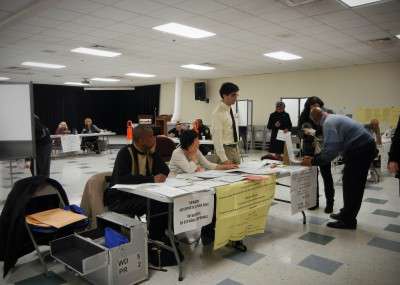
Statewide, voter turnout on Tuesday for the 2014 general election in Massachusetts was slightly lower than previous midterms, but there was a significant increase in the number of Boston voters hitting the polls.
The election had a final turnout of 2,123,349 votes out of the 4,342,841 registered voters in Massachusetts as of 2012, which is about 48.89 percent, according to the Associated Press with 99 percent of precincts reported at press time. Compared to the 2010 midterm general election, about 55.35 percent of registered voters showed up to the polls, about 20,000 more people than in 2014. In the 2012 election with a presidential race, about 73.32 percent of registered voters cast their ballot.
However, Boston residents had high participation in the 2014 election compared to other off year ones. With 100 percent of precincts reported, about 83.65 percent of the 383,702 registered voters cast their ballot, according to city statistics from the Boston Elections Department. In 2010, only about 44.31 percent went out to the polls.
“Now that I’m a citizen, I want to be involved as much as possible to make a difference,” said Minh Do, 40, of Fenway. “I want to make sure that our state is represented by one of the people who I value and who has similar core values that I do and who could make a difference in our state.”
Democratic candidate Martha Coakley and Republican candidate Charlie Baker faced off as the two major-party candidates for the governor’s seat.
Looking past the content of the platforms of each candidate, many voters said they made their decisions based on prior bipartisan political affiliation.
“I’m not terribly thrilled with her [Coakley’s] choices, but I see her as someone who is really earnest and knows her stuff,” said Paula Coyle, 56, of Allston. “She’s solid as a rock, and I like her rhetoric way better than [Baker’s]. I tend to be a Democrat, so for the most part, I just go straight down the ticket unless I have strong feelings, and mostly, I have real strong feelings for the Democrats I lean towards.”
While relying on party affiliation, some residents said they find Coakley’s demeanor unaccommodating.
Jennifer Pearson, 56, of Beacon Hill, said Coakley has a hard time appealing to the general public and said she would not be a charismatic leader. However, Pearson said she still voted for Coakley.
Several voters expressed frustration with the way some political campaigns were handled, especially with negative political advertisement tactics.
“It does seem like the campaign strategy, not just in Massachusetts, but across the entire country is to tear down the other opponent as opposed to putting out compelling reasons why people should vote for you,” said Mark Lange, 50, of Fenway. “Although difficult to watch all of the ads all of the time, I still think they are the best use of [candidates’] money.”
Lange said he was unhappy with both the Republican and Democratic candidates and therefore relied on his Republican affiliation when completing his ballot. He said he was not inspired by either candidate and believes that a Republican in office will provide equality.
Television advertisements were a prominent part of a campaigning strategy frequently utilized by the candidates and their respective parties. Voters said advertisements should be used for a more positive purpose, rather than to show disdain for other slanderous advertisements sponsored by the candidates.
“Most of the ads seem to belittle the other person, talk about their shortcomings, and I just don’t think that’s appropriate,” said Craig Misner, 46, of Fenway. “I’d rather them talk about what they can do versus what the person running against them did 10 years ago.
Speaking to the traditionally Democratic Massachusetts government, some Republican voters said they hoped Baker will provide a necessary political balance to the office.
“Massachusetts can be bipartisan in a way that’s effective,” said Justine Chen, 27, of Fenway. “Maybe that can be a signal nationally to the federal government that it can work. I’m hopeful.”
Alluding to national political preferences, several voters said they chose to focus on economic issues this election. Among the four ballot questions, Question 4, about whether employees should be entitled to earned sick time, sparked their interests.
“Of everything, I cared most about economic issues. I think that things like minimum wage and paid sick leave are important to provide fairness for everybody,” Chen said. “Even though all of the economic indicators seem to show that the economy is improving, I don’t think it’s improving for a lot of the lower class people. So we need to be providing safety nets for those people. Recently, with this economic recovery, it’s recovered for top earners.”
Question 3 proposed a ban on three already-approved casinos in the Commonwealth. The electorate ultimately voted “No” on the question, meaning the law will not be repealed and the three projects will continue as planned.
“The casino one – I voted yes on that to not allow the expansion,” said Aaron Radez, 31, of Beacon Hill. “That kind of goes back to economics a little bit. The long-term play isn’t a solid value proposition. I’d rather see us develop more around the innovation economy rather than pandering to the lowest denominator and introducing vice as a mechanism for economic development.”
Alexandra David and Ryan McDonagh contributed to the reporting of this article.






















































































































Emily Granoff • Jun 10, 2015 at 11:41 am
How did you find voter turnout rates for Boston, specifically? I need to find voter turnout by district/town/county for a grant proposal and I am having quite a bit of trouble with it. Any help would be appreciated.